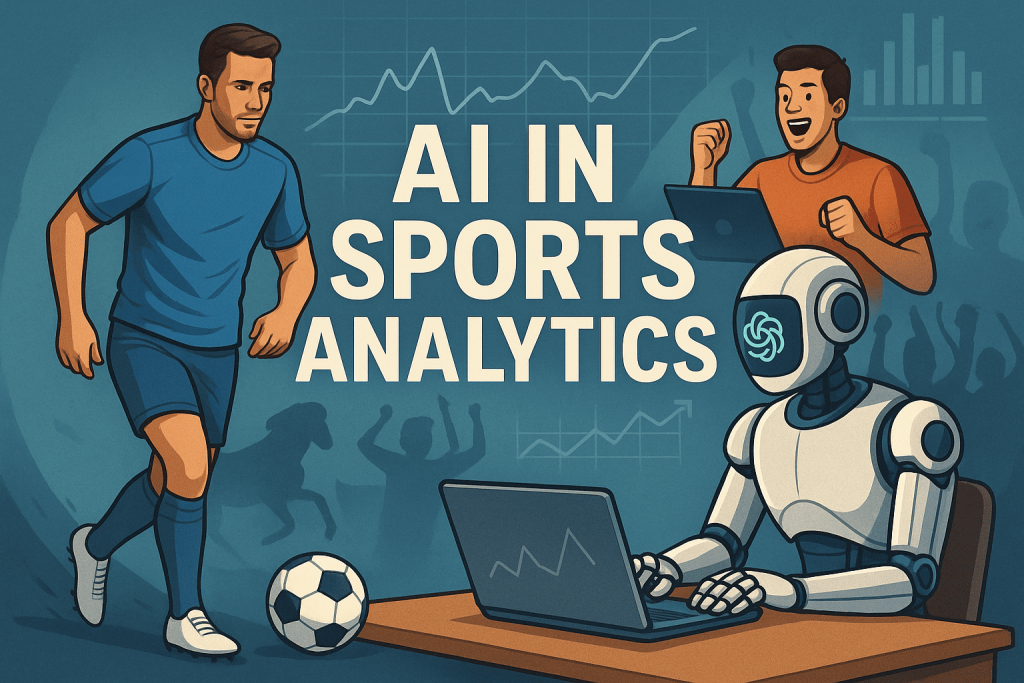In recent years, artificial intelligence (AI) has rapidly become an integral tool in the world of sports. No longer confined to science labs and tech startups, AI now plays a vital role on and off the field — from optimizing athlete performance and predicting match outcomes to revolutionizing the fan experience with personalized content. This article explores how AI-driven sports analytics is transforming the industry, benefiting athletes, coaches, analysts, and fans alike.
How AI is Transforming Performance Analysis
One of the most profound applications of AI in sports lies in performance enhancement. AI systems use computer vision, sensor data, and machine learning algorithms to break down an athlete’s movement, strategy, and physiological data with extreme precision. Wearable devices and smart cameras collect data such as speed, heart rate, acceleration, fatigue levels, and movement patterns. These are then analyzed in real time to identify areas for improvement and detect potential injuries before they happen.
For example, in sports like soccer and basketball, AI analyzes game footage to determine optimal positioning, passing accuracy, and even decision-making tendencies. Coaches can use these insights to tailor training programs, adjust tactics, and improve overall efficiency. In tennis, systems like IBM’s Watson help players and their coaches assess swing mechanics and compare strategies with historical data. This level of granular feedback was once unimaginable and now helps athletes gain a critical competitive edge.
Predictive Modeling and Game Strategy
AI also plays a central role in predictive analytics. By processing vast datasets — including past performances, player conditions, team dynamics, and even weather — AI algorithms can forecast game outcomes with surprising accuracy. These predictions are used by coaches to plan game strategies, assess risks, and make real-time decisions during matches.
In professional sports leagues such as the NFL, NBA, and Premier League, AI models are used to simulate different in-game scenarios. This helps coaching staff prepare for various match conditions and adapt strategies on the fly. In baseball, systems like Statcast track the trajectory of every ball and movement of every player, allowing managers to evaluate defensive alignments and pitcher-batter matchups more effectively.
AI for Injury Prevention and Recovery
Injury prevention is another vital area where AI is making a measurable impact. By analyzing biomechanical and physiological data, AI can flag subtle signs of strain, fatigue, or stress that might lead to injuries. Some AI platforms even provide recovery recommendations based on the athlete’s personal health data and past performance trends.
This has enormous implications for professional sports, where the health of elite athletes can define the outcome of entire seasons. AI-enabled rehabilitation programs ensure personalized care, track recovery progress, and suggest modifications to reduce re-injury risk — making recovery faster, safer, and more effective.
Enhancing Fan Engagement with AI
AI is not only revolutionizing how teams perform but also how fans engage with sports. AI algorithms now power personalized content experiences, helping sports franchises deliver tailored news, highlights, merchandise suggestions, and real-time updates based on each fan’s preferences and behavior.
Virtual assistants and chatbots answer questions, guide users through event schedules, and recommend ticket purchases. Sports broadcasters employ AI to automatically generate highlight reels by detecting moments of peak excitement, such as goals or game-winning plays. Social media platforms use AI to curate and recommend relevant content — keeping fans engaged even when games aren’t live.
Fantasy sports and sports betting have also seen a dramatic shift. AI models deliver up-to-the-minute predictions and player stats, giving fans an edge in making decisions. This personalization and interactivity deepen fan loyalty and transform passive spectators into engaged participants.
Challenges and Ethical Considerations
Despite the vast benefits, the use of AI in sports analytics is not without concerns. Issues surrounding data privacy, player consent, and over-reliance on algorithms are becoming more prevalent. There are also concerns about fairness and competitive balance — teams with greater access to AI resources might hold a disproportionate advantage.
Furthermore, the use of predictive AI in betting and fantasy sports can raise ethical concerns if not properly regulated. Transparency in how AI makes decisions — particularly in coaching or recruitment — is essential to ensure trust in the system.
Conclusion
AI is reshaping the sports world in profound ways. From enhancing athlete performance and preventing injuries to engaging fans with personalized experiences, the integration of AI-powered analytics is driving innovation across the board. While ethical challenges and implementation barriers remain, the benefits of using AI in sports are undeniable — offering smarter strategies, deeper insights, and stronger connections between teams and their supporters. As technology continues to advance, the future of sports analytics looks faster, smarter, and more exciting than ever before.



So now a robot tells my favorite player when to rest? What happened to good ol’ gut instinct and locker room vibes? Too much data, not enough soul
Ya…. its modern furure…
ai sports analytics sounds sketchy Why ia now ?🤔
I mean, it’s just learnin from all the games that went down before, right? 🤔🤔
ai sports analytics hype 🤔 but real gains?
🙄 just stats ant real spirit